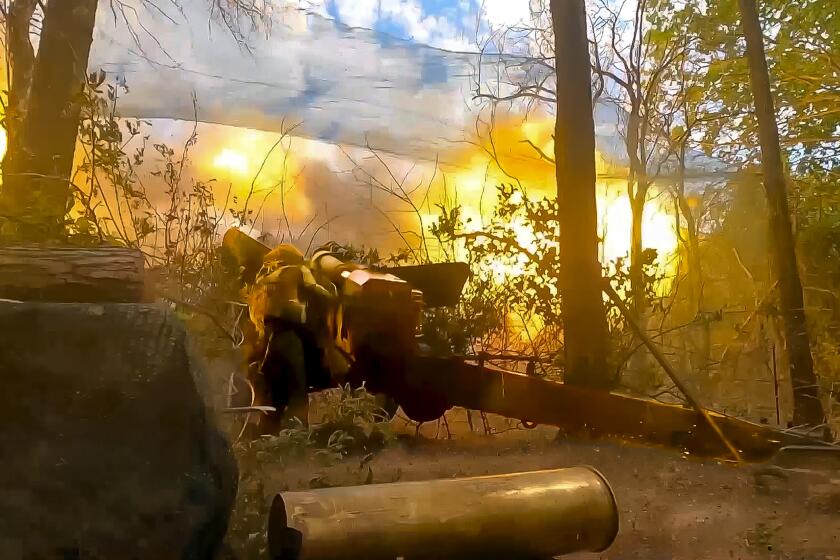A Voter-Confidence Test for Mexico : Salinas Hopes Crime-Buster Image Masks Economic Failings
As Mexico’s new administration enters its second semester, it begins to face the real challenges of management and reform. After six months of spectacular police actions against corrupt union leaders, businessmen and drug lords, but little headway on economic growth, political reform or recovery of his party’s standing in Mexican society, President Carlos Salinas de Gortari is running out of running room and into the law of diminishing returns.
The most dismal outlook is on the economic front: While debt negotiations stagnate, so does the economy. The prospect for growth for this year was dismissed by the administration from its outset. But given the difficulties of reaching an agreement with Mexico’s creditors that would both reduce outstanding debt substantially and provide new loans, it now appears doubtful that the economy will grow at more than 1% or 2% next year. On average, then, for the ninth consecutive year the Mexican economy will have expanded at a rate clearly below population growth. Per capita income will have declined by 20% during the 1980s.
Logically, this should be reflected at the polls. Once again, the economic crisis has put the government and the PRI (Institutional Revolutionary Party) in an uncomfortable position for an important round of voting--Sunday’s state elections in Michoacan, Baja California and Chihuahua.
Because everyday life, or even the prospect of a better life tomorrow, is dismal, the PRI can scarcely be expected to achieve Salinas’ laudable aim--that his party win a clean election. In fact, Salinas and his PRI face the same devil’s alternative that their predecessors have faced since 1982: the widespread belief in the country that they can either steal elections or lose them, but not win them cleanly. While this is not entirely fair, it is not totally unwarranted, either. Half of a century of electoral tampering under conditions in which the PRI might actually have won, followed by nearly a decade during which the PRI has won under highly questionable circumstances, provide solid historical reasons for suspecting the worst. As the right-of-center PAN (National Action Party) has asserted, some recent incidents justify present suspicions of fraud. According to the PAN, in Chihuahua up to 200,000 “phantom” names were added to the electoral rolls in the past month, while a significant number of PAN sympathizers were dropped from the rolls. Fifteen thousand unregistered ballots for the election were found in a washroom at the state government’s printing plant. A similar batch of mysterious ballots was discovered in Baja California, causing opposition leaders there to demand postponement of the election.
The PRI has been openly up to its old tricks elsewhere. In a rerun election two weeks ago in the small Tlaxcala town of Contla de Juan Cuamatzi, it lost in 12 of 13 precincts or polling booths, but in the 13th precinct it obtained 797 votes in six hours, enough to win.
The state contests to be decided Sunday are by no means pushovers for the opposition. Yet in private, most analysts, even within the PRI, are pessimistic about the government’s chances and its willingness to accept a defeat. Understandably so: A setback for the president’s party in its first three by-elections would contradict his claims of growing popularity.
In fact, while many of Salinas’ media coups may have enhanced his standing among the Mexican people (there are polls that substantiate his claim, as well as polls that disprove it), it does appear that the public-relations blitz is wearing thin. The latest one, while not yet backfiring, is having contradictory effects. This is the arrest and indictment last week of Jose Antonio Zorrilla Perez, former chief of the now-defunct Federal Security Directorate, for the murder five years ago of Manuel Buendia, a popular crusading columnist.
Zorrilla’s arrest was applauded, and rightly so, by Mexico’s journalists as a major step in re-establishing rule by law. Bringing Buendia’s murderers to justice had become one of the most important demands of the intellectual community.
But immediately problems surfaced. To begin with, Zorrilla was accused of being the “intellectual author” of the crime, not of actually having pulled the trigger. As of this writing, only one other person, the man accused of driving the getaway motorcycle, has been arrested. He named as the triggerman a policeman who was shot and killed in 1984.
There’s another, potentially more damaging, problem. As Mexico’s newspaper cartoonists have pointed out every day since Zorrilla’s arrest, as chief of the country’s security police, he had only two bosses: former Minister of the Interior (and now Minister of Education) Manuel Bartlett Diaz, and former President Miguel de la Madrid. It is difficult to believe that Zorrilla could have committed the crimes he is charged with without protection and/or some form of a cover-up at the highest level. What is more incredible is that Zorrilla, named in the press as a suspect from the beginning, was in charge of investigating Buendia’s murder for nearly a year and remained free for four years after that, even traveling abroad.
If Zorrilla’s arrest enhanced the government’s credibility, its unwillingness, so far, to go beyond Zorrilla has weakened it. Yet openly implicating Bartlett or De la Madrid would constitute a break with the rules of the Mexican political system on a scale unheard of until now.
The problem still lies in the unopened ballot packets of last year’s election: Lacking legitimacy at the polls, the Salinas administration is trying to win it elsewhere. Unable to go the old-fashioned way, through economic growth, it has pursued crime-busting spectaculars with short-term benefits and long-term costs. The short-term is shrinking, and the long-term is quickly approaching. The plot will take its next turn on Sunday.
More to Read
Sign up for Essential California
The most important California stories and recommendations in your inbox every morning.
You may occasionally receive promotional content from the Los Angeles Times.









